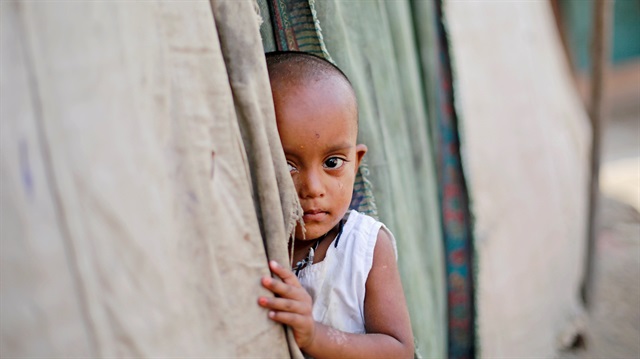
Rohingya Muslims were detained in India in 2012 and since then they were kept in a central prison in northeastern state
India on Thursday deported seven Rohingya Muslims to Myanmar, hours after the country’s top court refused to stop the government from deporting them.
The immigrants were detained in 2012 and since then they were kept at the Silchar central prison in Cachar district of Assam, the northeastern state of India.
“They have been handed over to Myanmar authorities at 1.30 p.m. local time [8800GMT]...,” S Ibomcha Singh, a police official, told Hindustan Times.
Earlier, the Supreme Court of India had allowed the deportation of the Rohingya, saying they were found by the competent court as illegal immigrants and have been accepted by their country of origin as citizens.
According to the daily, an intelligence report states that there are about 32 Rohingya, including 15 minors, at detention camps in Assam.
UNHCR requested permission to access the Rohingya in Assam, but its request was not accepted.
The UN refugee agency’s India office expressed concern over Indian government decision to deport Rohingya.
The current conditions in Myanmar’s Rakhine state, which the Muslim minority group fled, are “not conducive for the safe, dignified and sustainable returns for Rohingya,” the office told The Wire, an India news website.
On Tuesday, E. Tendayi Achiume, United Nations’ special rapporteur on racism said: “Given the ethnic identity of the men, this is a flagrant denial of their right to protection and could amount to refoulement,”
“The Indian government has an international legal obligation to fully acknowledge the institutionalized discrimination, persecution, hate and gross human rights violations these people have faced in their country of origin and provide them the necessary protection," she added.
Amnesty International's India office also voiced concern on Twitter, saying: "SC [Supreme Court] refuses to stop govt's decision to expel 7 Rohingya men to Myanmar today. The human rights situation in Myanmar has deteriorated completely. Returning them to Myanmar puts them at grave risk of serious human rights violations violates customary international law."
The European Rohingya Council (ERC), an Amsterdam-based Rohingya rights group, also called on India to immediately stop deportation of Rohingya.
Since Aug. 25, 2017, nearly 24,000 Rohingya Muslims have been killed by Myanmar’s state forces, according to a report by the Ontario International Development Agency (OIDA).
More than 34,000 Rohingya were also thrown into fires, while over 114,000 others were beaten, said the OIDA report, entitled "Forced Migration of Rohingya: The Untold Experience".
Some 18,000 Rohingya women and girls were raped by Myanmar’s army and police, and over 115,000 Rohingya houses were burned down and 113,000 others vandalized, it added.
According to Amnesty International, more than 750,000 Rohingya refugees, mostly children and women, fled Myanmar and crossed into Bangladesh after Myanmar forces launched a crackdown on the minority Muslim community in August 2017.
The Rohingya, described by the UN as the world's most persecuted people, have faced heightened fears of attack since dozens were killed in communal violence in 2012.
The UN has documented mass gang rapes, killings -- including of infants and young children -- brutal beatings, and disappearances committed by Myanmar state forces. In a report, UN investigators said such violations may have constituted crimes against humanity.




